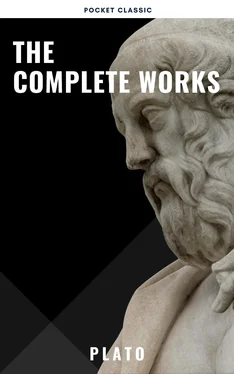POLUS: To that, Socrates, there can be but one answer.
SOCRATES: Then rhetoric is of no use to us, Polus, in helping a man to excuse his own injustice, that of his parents or friends, or children or country; but may be of use to any one who holds that instead of excusing he ought to accuse—himself above all, and in the next degree his family or any of his friends who may be doing wrong; he should bring to light the iniquity and not conceal it, that so the wrong-doer may suffer and be made whole; and he should even force himself and others not to shrink, but with closed eyes like brave men to let the physician operate with knife or searing iron, not regarding the pain, in the hope of attaining the good and the honourable; let him who has done things worthy of stripes, allow himself to be scourged, if of bonds, to be bound, if of a fine, to be fined, if of exile, to be exiled, if of death, to die, himself being the first to accuse himself and his own relations, and using rhetoric to this end, that his and their unjust actions may be made manifest, and that they themselves may be delivered from injustice, which is the greatest evil. Then, Polus, rhetoric would indeed be useful. Do you say ‘Yes’ or ‘No’ to that?
POLUS: To me, Socrates, what you are saying appears very strange, though probably in agreement with your premises.
SOCRATES: Is not this the conclusion, if the premises are not disproven?
POLUS: Yes; it certainly is.
SOCRATES: And from the opposite point of view, if indeed it be our duty to harm another, whether an enemy or not—I except the case of self-defence— then I have to be upon my guard—but if my enemy injures a third person, then in every sort of way, by word as well as deed, I should try to prevent his being punished, or appearing before the judge; and if he appears, I should contrive that he should escape, and not suffer punishment: if he has stolen a sum of money, let him keep what he has stolen and spend it on him and his, regardless of religion and justice; and if he have done things worthy of death, let him not die, but rather be immortal in his wickedness; or, if this is not possible, let him at any rate be allowed to live as long as he can. For such purposes, Polus, rhetoric may be useful, but is of small if of any use to him who is not intending to commit injustice; at least, there was no such use discovered by us in the previous discussion.
CALLICLES: Tell me, Chaerephon, is Socrates in earnest, or is he joking?
CHAEREPHON: I should say, Callicles, that he is in most profound earnest; but you may well ask him.
CALLICLES: By the gods, and I will. Tell me, Socrates, are you in earnest, or only in jest? For if you are in earnest, and what you say is true, is not the whole of human life turned upside down; and are we not doing, as would appear, in everything the opposite of what we ought to be doing?
SOCRATES: O Callicles, if there were not some community of feelings among mankind, however varying in different persons—I mean to say, if every man’s feelings were peculiar to himself and were not shared by the rest of his species—I do not see how we could ever communicate our impressions to one another. I make this remark because I perceive that you and I have a common feeling. For we are lovers both, and both of us have two loves apiece:—I am the lover of Alcibiades, the son of Cleinias, and of philosophy; and you of the Athenian Demus, and of Demus the son of Pyrilampes. Now, I observe that you, with all your cleverness, do not venture to contradict your favourite in any word or opinion of his; but as he changes you change, backwards and forwards. When the Athenian Demus denies anything that you are saying in the assembly, you go over to his opinion; and you do the same with Demus, the fair young son of Pyrilampes. For you have not the power to resist the words and ideas of your loves; and if a person were to express surprise at the strangeness of what you say from time to time when under their influence, you would probably reply to him, if you were honest, that you cannot help saying what your loves say unless they are prevented; and that you can only be silent when they are. Now you must understand that my words are an echo too, and therefore you need not wonder at me; but if you want to silence me, silence philosophy, who is my love, for she is always telling me what I am now telling you, my friend; neither is she capricious like my other love, for the son of Cleinias says one thing to-day and another thing to-morrow, but philosophy is always true. She is the teacher at whose words you are now wondering, and you have heard her yourself. Her you must refute, and either show, as I was saying, that to do injustice and to escape punishment is not the worst of all evils; or, if you leave her word unrefuted, by the dog the god of Egypt, I declare, O Callicles, that Callicles will never be at one with himself, but that his whole life will be a discord. And yet, my friend, I would rather that my lyre should be inharmonious, and that there should be no music in the chorus which I provided; aye, or that the whole world should be at odds with me, and oppose me, rather than that I myself should be at odds with myself, and contradict myself.
CALLICLES: O Socrates, you are a regular declaimer, and seem to be running riot in the argument. And now you are declaiming in this way because Polus has fallen into the same error himself of which he accused Gorgias:—for he said that when Gorgias was asked by you, whether, if some one came to him who wanted to learn rhetoric, and did not know justice, he would teach him justice, Gorgias in his modesty replied that he would, because he thought that mankind in general would be displeased if he answered ‘No’; and then in consequence of this admission, Gorgias was compelled to contradict himself, that being just the sort of thing in which you delight. Whereupon Polus laughed at you deservedly, as I think; but now he has himself fallen into the same trap. I cannot say very much for his wit when he conceded to you that to do is more dishonourable than to suffer injustice, for this was the admission which led to his being entangled by you; and because he was too modest to say what he thought, he had his mouth stopped. For the truth is, Socrates, that you, who pretend to be engaged in the pursuit of truth, are appealing now to the popular and vulgar notions of right, which are not natural, but only conventional. Convention and nature are generally at variance with one another: and hence, if a person is too modest to say what he thinks, he is compelled to contradict himself; and you, in your ingenuity perceiving the advantage to be thereby gained, slyly ask of him who is arguing conventionally a question which is to be determined by the rule of nature; and if he is talking of the rule of nature, you slip away to custom: as, for instance, you did in this very discussion about doing and suffering injustice. When Polus was speaking of the conventionally dishonourable, you assailed him from the point of view of nature; for by the rule of nature, to suffer injustice is the greater disgrace because the greater evil; but conventionally, to do evil is the more disgraceful. For the suffering of injustice is not the part of a man, but of a slave, who indeed had better die than live; since when he is wronged and trampled upon, he is unable to help himself, or any other about whom he cares. The reason, as I conceive, is that the makers of laws are the majority who are weak; and they make laws and distribute praises and censures with a view to themselves and to their own interests; and they terrify the stronger sort of men, and those who are able to get the better of them, in order that they may not get the better of them; and they say, that dishonesty is shameful and unjust; meaning, by the word injustice, the desire of a man to have more than his neighbours; for knowing their own inferiority, I suspect that they are too glad of equality. And therefore the endeavour to have more than the many, is conventionally said to be shameful and unjust, and is called injustice (compare Republic), whereas nature herself intimates that it is just for the better to have more than the worse, the more powerful than the weaker; and in many ways she shows, among men as well as among animals, and indeed among whole cities and races, that justice consists in the superior ruling over and having more than the inferior. For on what principle of justice did Xerxes invade Hellas, or his father the Scythians? (not to speak of numberless other examples). Nay, but these are the men who act according to nature; yes, by Heaven, and according to the law of nature: not, perhaps, according to that artificial law, which we invent and impose upon our fellows, of whom we take the best and strongest from their youth upwards, and tame them like young lions,— charming them with the sound of the voice, and saying to them, that with equality they must be content, and that the equal is the honourable and the just. But if there were a man who had sufficient force, he would shake off and break through, and escape from all this; he would trample under foot all our formulas and spells and charms, and all our laws which are against nature: the slave would rise in rebellion and be lord over us, and the light of natural justice would shine forth. And this I take to be the sentiment of Pindar, when he says in his poem, that
Читать дальше












